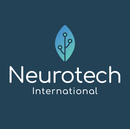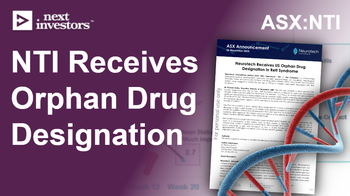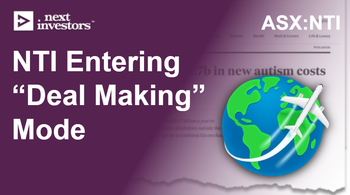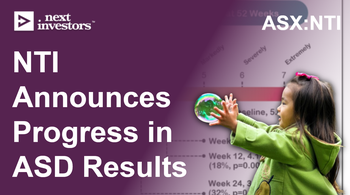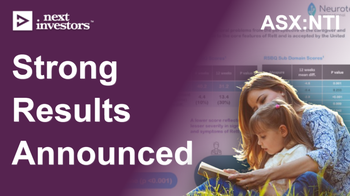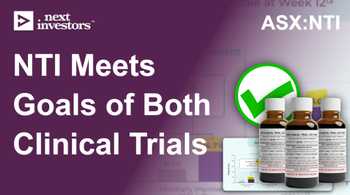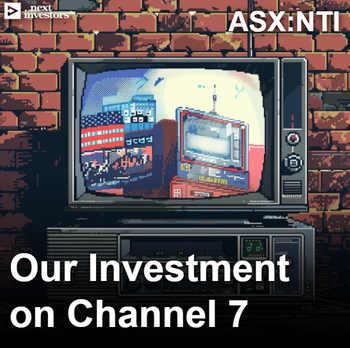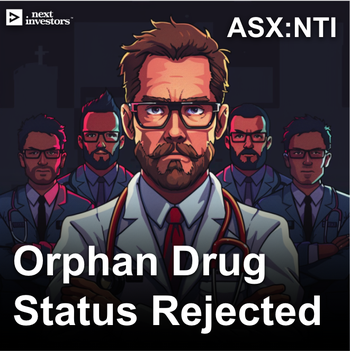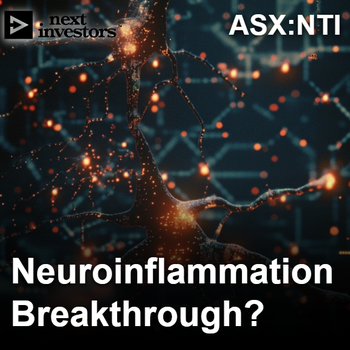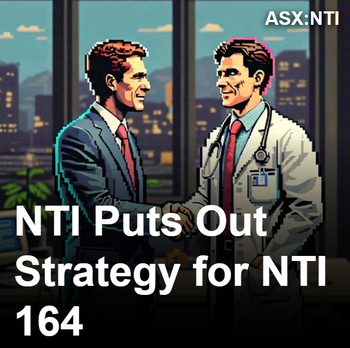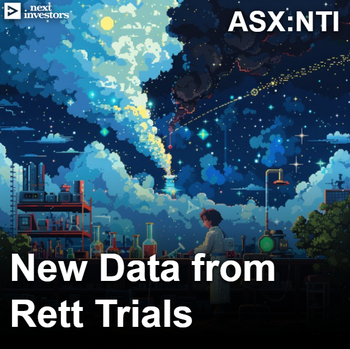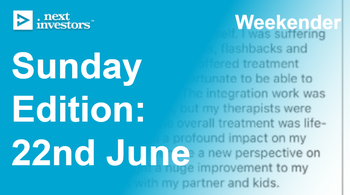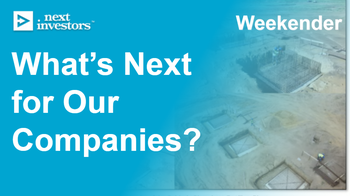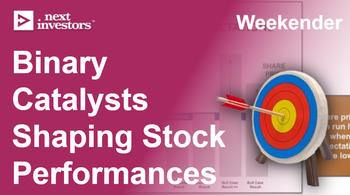Investment Memo:
Neurotech International
(ASX:NTI)
-
LIVE
Opened: 14-Aug-2024
Shares Held at Open: 8,020,000
Options Held at Open: 350,000
What does NTI do?
Neurotech International (ASX:NTI) is a clinical stage biotech company.
NTI aims to treat rare and severe neurological disorders predominantly in children.
NTI’s primary treatment is a cannabinoid derived biopharmaceutical called NTI164.
NTI is seeking to prove that NTI164 is a both safe and effective treatment for disorders such as Autism Spectrum Disorder, Rett Syndrome, PANDAS/PANS and Cerebral Palsy.
NTI is advancing clinical trials to gather evidence, and is exploring global partnership opportunities to bring its product to market.
What is the macro theme?
Biotech investing can be rewarding from both a human perspective (saving lives, patient outcomes improving) and financial perspective (company making scientific breakthroughs can deliver big returns).
NTI is focussed on neurological disorders mostly in children, across potential orphan drug indications for rare conditions, such as Rett Syndrome as well as disorders that have larger total addressable markets such as Autism Spectrum Disorder (ASD).
Our Big Bet for NTI
“NTI re-rates to a +$500M market cap by successfully advancing one or more of its clinical trial programs through to regulatory approval, partnership/licensing and/or is acquired by a large pharmaceutical company”
NOTE: our “Big Bet” is what we HOPE the ultimate success scenario looks like for this particular Investment over the long term (3+ years). There is a lot of work to be done, many risks involved - just some of which we list in our NTI Investment Memo. Success will require a significant amount of luck. There is no guarantee that our Big Bet will ever come true.
Why did we invest in NTI?
Clinical trials have demonstrated that NTI’s product helps treat neurological disorders
- PANDAS/PANS - Phase I/II trial showed clinically significant and meaningful improvements in clinical function, with excellent safety and tolerability over 12 weeks.
- Rett Syndrome - Phase I/II trial had an excellent safety profile compared to the leading drug DAYBUE, as well as clinically significant efficacy results that continued to improve over time.
- Autism Spectrum Disorder - Phase II trial showed that after 12 weeks of receiving NTI’s product patients with severe ASD improved to the point where symptoms are present but barely noticeable.
Targeting Orphan Drug Designations (ODD) for rare diseases
We like NTI’s strategy of focusing on Orphan Drug Designations for rare diseases. These treatments have a small patient pool because diseases are rare. Due to this, there are significant unmet needs, and treatments attract premium pricing.
Successful orphan drug treatments are highly valued by the market.
NTI following the multi-billion dollar Neuren Pharmaceuticals playbook
ASX listed Neuren Pharmaceuticals has grown more than 3,000% (~$100M market cap to a peak market cap of ~$3.3BN) off the back of commercialising its treatment for the rare disease Rett Syndrome.
NTI is trying to replicate Neuren’s path to success through its own orphan targets.
Potential for “out of the blue” global markets commercialisation deal
NTI is on the hunt for a commercial partner to develop its product NTI164 overseas (US, EU, Asia).
Any partnership or commercialisation deal will significantly defray the financial and clinical risk for the company, and is a large potential catalyst for the company if signed.
Successful biotech fund, Merchant Group, has a substantial position in NTI
Merchant Group became a substantial shareholder of NTI with a 5.01% stake when NTI was trading at ~9 cents and has recently been adding to its position in the company. As of March 2024 Merchant owns 7.12% of NTI.
We have followed Merchant Group’s investments closely and successfully Invested in a number of them (DXB, ALA, NTI, IIQ).
We like the fund’s long term approach to investing (like us) and we like to follow the fund into biotechs in particular given its past success.
NTI Management track record
NTI’s Executive Director is Dr Tom Duthy, who is also Chairman of Arovella Therapeutics, another one of our Portfolio Companies, which grew from a low of 2 cents to a high of 18 cents.
Tom was also the head of corporate development for Sirtex Medical before its $1.9BN takeover in 2019.
We like to follow management that has delivered for us in the past.
Large addressable market for Autism treatment
Aside from Autism Spectrum Disorder (ASD) costs the Australian taxpayer $5.9 billion each year through the NDIS.
It is responsible for over 30% of the NDIS spending each year because ASD affects 1 in 100 children.
This is a big market for NTI to target and if it can develop a commercial solution it will be able to capture significant value.
What do we expect NTI to deliver?
Objective #1: Orphan Drug Designation & progress with FDA
NTI164 has shown very promising results in clinical trials so far. Over the next 12 months NTI will aim to grow the global profile of its lead product NTI164 through attaining orphan drug status for certain conditions, and various preclinical studies.
These are all important for the ultimate goal of an IND grant from the FDA.
Milestones
 Orphan drug status Rett Syndrome (US)
Orphan drug status Rett Syndrome (US)
 Orphan drug status Rett Syndrome (Europe)
Orphan drug status Rett Syndrome (Europe)
 Orphan drug status PANDAS/PANS (US)
Orphan drug status PANDAS/PANS (US)
 Orphan drug status PANDAS/PANS (Europe)
Orphan drug status PANDAS/PANS (Europe)
 Investigational New Drug (IND) application (FDA)
Investigational New Drug (IND) application (FDA)
 IND granted with the FDA
IND granted with the FDA
Objective #2: Secure a global partner for NTI164
We want to see NTI advance commercialisation initiatives and, ideally, accelerate them. This could be a source of additional capital for the business to fund offshore trials and advance regulatory requirements.
Milestones
 Licensing/partnership agreement
Licensing/partnership agreement
 Partnership on global clinical strategy
Partnership on global clinical strategy
 Potential M&A deal (Strategic equity investment?)
Potential M&A deal (Strategic equity investment?)
Objective #3: Commercialise NTI164 in Australia
We want to see NTI complete precursor toxicology/PK studies and lodge provisional registration applications with the TGA for PANDAS/PANS and Rett Syndrome.
Milestones
 Complete toxicology trials
Complete toxicology trials
 Complete pharmacokinetic (PK) trials
Complete pharmacokinetic (PK) trials
 Pre-submission meeting with the TGA
Pre-submission meeting with the TGA
 Application for provisional pathway
Application for provisional pathway
 Provisional pathway granted
Provisional pathway granted
Objective #4: Cerebral Palsy Clinical Trials
NTI intends to launch a Phase I/II clinical trial for Cerebral Palsy in 2H CY2024. We see this as a source of additional upside for NTI over the long term.
Milestones
 HREC Approval and TGA clearance
HREC Approval and TGA clearance
 First patient recruited
First patient recruited
 Completion of patient recruitment
Completion of patient recruitment
 Last patient dosed
Last patient dosed
 8-week results
8-week results
 12-week results
12-week results
Regulatory risk
There are a number of key regulatory hurdles that NTI will need to clear.
This includes but is not limited to IND applications with the FDA, orphan drug status, provisional approval for fast tracked commercialisation with the TGA.
There is no guarantee that these regulatory approvals will be granted and if they are rejected it will be a big setback for NTI.
Partnership risk
NTI is looking to bring on a partner to help fund its clinical trial work globally.
These deals can take a long time and delays do happen.
There is no guarantee that NTI finds a suitable partner, or if the deal that NTI ends up securing meets market expectations in terms of value.
Clinical trial risk
It is important to be aware that clinical trials can be unsuccessful.
Here are some of the standard risks that are associated with biotechs that are undertaking clinical research:
- Patient recruitment is delayed or fails
- Ethics approval is delayed or fails
- Clinical trial cost blowouts
- The drug/treatment is not considered safe for human consumption (usually established in Phase I)
- The drug or treatment is ineffective at treating the particular disease (usually determined by clinical trial results in Phase II and Phase III)
- The design of the trial is such that the regulatory body does not approve the drug/treatment
There is a chance that one or more of NTI’s clinical trials fail to meet their primary or secondary endpoints, meaning the treatments fail to satisfy the criteria of the studies. Any clinical trial results, if negative, could hurt the NTI share price.
Competition risk
NTI will need to move quickly to establish its presence in the market. If progress is slow, alternative treatments could emerge hurting NTI’s prospects.
Funding risk
Pre revenue biotech companies regularly need to raise capital to fund their growth ambitions. Capital raises can cause dilution to existing shareholders.
As a pre-revenue company, NTI will likely need to raise capital at some stage in the future, potentially at a discount to the prevailing market prices to secure funding. This will be contingent on clinical trial results and broader market sentiment (see next risk).
Market risk
Broader market sentiment for small pre-revenue biotechs could deteriorate and the sector as a whole trades lower, taking NTI’s share price with it.
Alternatively, the entire equities market could sell down as well.
What is our investment plan?
Our Investment Plan for NTI is to hold on to a majority of our position to see the company execute on its business strategy over the next two to three years.
If the company’s share price materially re-rates in the medium term due to the results of any of the clinical trial results, a macro triggering event or any other unknown reason, we may look to sell up to ~20% of our holding. See our general disclosure policy for more details.
Disclosure: Disclosure: S3 Consortium Pty Ltd (the Company) and Associated Entities own 8,020,000 NTI shares and 350,000 NTI Options at the time of publishing this Investment Memo. The Company has been engaged by NTI to share our commentary on the progress of our Investment in NTI over time.
Investment Memo:
Neurotech International
(ASX:NTI)
-
CLOSED
Opened: 18-Sep-2023
Closed:
14-Aug-2024
Shares Held at Open:
8,400,000
Shares Held at Close:
8,020,000
Reason Memo Closed:
Updated company strategy
What does NTI do?
Neurotech International (ASX: NTI) is a clinical stage biotech company.
NTI is advancing clinical trials targeting rare and severe neurological disorders predominantly in children.
NTI’s primary treatment is a cannabinoid derived biopharmaceutical called NTI164. NTI is seeking to prove it is a both safe and effective treatment for disorders such as Autism Spectrum Disorder, Rett Syndrome, PANDAS/PAN and Cerebral Palsy.
What is the macro theme?
Paediatric neurological disorders are not getting as much attention from biotech companies as they should, but luckily there are government incentives for companies developing treatments for these disorders.
The impact to families who have children with these disorders is significant and society more generally bears a large cost in supporting these families. Moreover, some treatments can have bad side effect profiles or suboptimal efficacy.
NTI’s clinical trials are for disorders of the brain and spinal cord, mostly in children, across potential orphan drug indications for rare conditions, such as Rett Syndrome as well as disorders that have larger total addressable markets such as Autism Spectrum Disorder (ASD). Both avenues to market for NTI164 could prove lucrative, assuming the trials are successful.
As is often the case, biotechs that successfully complete clinical trials can generate sustained re-rates as positive data comes out, regulatory approvals are granted and commercialisation agreements are made.
We think that companies that can improve on existing standards of care across both safety and efficacy will attract capital in the market due to their ability to improve both quality of life and health economics.
[Memo Assessment - 14-Aug-2024]:
Sentiment = Very Strong
NTI is leveraged to two key investment thematics, “orphan drugs” (specifically for neurological diseases in children) and “autism”. Both of these macro thematics have been strong in the last twelve months.
Leading orphan drug company Neuren published first sales for its DAYBUE product of US$66.9M in the quarter. The company’s share price is up even higher than when we first invested in NTI, showing the huge market attention and demand for the product.
Also within the last 12 months, autism, and its cost to the $42BN NDIS, has been under the spotlight with the Australian Federal Budget highlighting that reforms may be needed to reduce this cost. This however means that children that rely on the NDIS may not have access to the care that they need, highlighting the importance of a treatment like NTI164
Our Big Bet for NTI
“NTI re-rates to a +$500M market cap by successfully advancing one or more of its clinical trial programs through to regulatory approval, partnership/licensing and/or is acquired by a large pharmaceutical company”
NOTE: our “Big Bet” is what we HOPE the ultimate success scenario looks like for this particular Investment over the long term (3+ years). There is a lot of work to be done, many risks involved - just some of which we list in our NTI Investment Memo. Success will require a significant amount of luck. There is no guarantee that our Big Bet will ever come true.
Why did we invest in NTI?
NTI has significant material newsflow in the next 6-12 months across 3 trials
Clinical trial results are massive share price catalysts for biotechs. NTI has three different trials completing over the next 12 months. One of them is expected in the next couple of weeks.
[Memo Assessment - 14-Aug-2024]:
Grade = A
NTI delivered on all three catalysts that were forecast for the company. The results of these catalysts were also positive with the company now able to move through to the next stage of development.
NTI is targeting “orphan” diseases - treatments that are highly valuable
NTI is currently targeting PANDAS/PANS and Rett Syndrome, which are potentially eligible for orphan drug designation. The average price for an orphan drug is US$32,000 per year per patient and government approvals to market are fast tracked.
[Memo Assessment - 14-Aug-2024]:
Grade = A
NTI is following the same strategy as the $1.4BN capped Neuren
Neuren Pharmaceuticals’ share price re-rated by more than 1,300% (~$100M market cap to $1.4BN market cap). Neuren developed a successful treatment for Rett Syndrome and is working on other orphan diseases. NTI is unashamedly trying to replicate Neuren’s path to success. We like this approach.
[Memo Assessment - 14-Aug-2024]:
Grade = A
The Neuren story continues to grow. During our Memo period, Neuren's market cap hit ~$3.3BN, and NTI delivered clinical trial results from its Rett Syndrome trial. Ultimately, we remain Invested in NTI to see its value start to appreciate further toward Neuren.
Strong safety profile, is NTI’s treatment better than $1.4BN Neuren?
If NTI’s upcoming Rett Syndrome trial shows its treatment is SAFER than $1.4BN Neuren’s “claim to fame” Rett Syndrome treatment, we think NTI can take a big chunk of the market (and hopefully get to a similar $1.4BN market cap).
[Memo Assessment - 14-Aug-2024]:
Grade = A
The results published from NTI’s Rett Syndrome trial showed that it was better than DAYBUE from a safety perspective. The efficacy data also showed similarly strong performance to DAYBUE.
Promising efficacy data at treating Autism, large addressable market
If NTI’s treatment is proven safe and effective for Autism Spectrum Disorder (ASD), we think it could become an important part of the overall care for ASD sufferers, which is 1 in 100 children.
[Memo Assessment - 14-Aug-2024]:
Grade = A
NTI was able to replicate the strong results from its Phase I Autism with much success. Autism continues to grow in Australia, and its cost to the healthcare system has been strongly in the spotlight.
NTI Management track record
NTI’s Executive Director is Dr Tom Duthy, who is also Chairman of Arovella Therapeutics, another one of our Portfolio Companies, which grew from a low of 2 cents to a high of 10.5 cents between January and April 2023. We like to follow management that has delivered for us in the past.
[Memo Assessment - 14-Aug-2024]:
Grade = A
NTI’s executive director Dr. Tom Duthy did what he said he would do on time and on budget. Once all of the trial data were published Duthy pulled the trigger on a meaningful $10M raise at 10 cents. This was at a peak market price for NTI, which provided minimal dilution for existing shareholders.
Successful fund, Merchant Group has a substantial position in NTI
Merchant Group became a substantial shareholder of NTI with a 5.01% stake when NTI was trading at ~9 cents. We have followed Merchant Group’s investments closely and think the fund has a keen eye for high potential biotechs given its past history of success.
[Memo Assessment - 14-Aug-2024]:
Grade = A
Merchant added to its position during our Memo period and now owns 7.12% of NTI which reinforces this reason.
What do we expect NTI to deliver?
Objective #1: Rett Syndrome clinical trials
NTI is currently undertaking a Phase I/II trial that will test the safety and efficacy of NTI’s treatment for a rare genetic neurological and developmental disorder called Rett Syndrome.
This is the same disease that Neuren Pharmaceuticals commercialised a treatment for which helped take Neuren to a ~$1.4BN market cap.
NTI’s trial is aiming to improve on Neuren’s results across safety and efficacy, after dosing the first patient in this trial in August 2023.
Milestones
 Last patient dosed for Phase I/II
Last patient dosed for Phase I/II
 Results (anticipated Q1 CY2024)
Results (anticipated Q1 CY2024)
[Memo Assessment - 14-Aug-2024]:
Grade = A
The results published from NTI’s Rett Syndrome successfully passed the primary endpoint. The results also showed that NTI164 had a much better safety profile compared to the market leading product DAYBUE and the efficacy was relatively similar.
Objective #2: Autism Spectrum Disorder (ASD) clinical trials
After a successful Phase I/II trial demonstrated the safety of NTI’s treatment in 2023, and showed promising signs on its efficacy, NTI launched a larger Phase II/III trial for ASD.
We expect NTI to complete recruitment for this trial before the end of 2023.
Milestones
 Completion of patient recruitment (H2 CY2023)
Completion of patient recruitment (H2 CY2023)
 Last patient dosed
Last patient dosed
 Results (Q1 CY2024)
Results (Q1 CY2024)
 52 week results
52 week results
[Memo Assessment - 14-Aug-2024]:
Grade = A
The results of the Autism trial passed the primary endpoint. Data that was published beyond the 8 week mark showed that the patients continued to improve.
Anecdotal evidence out of the trial was extremely positive. We think that these were excellent results.
Objective #3: PANDAS/PANS clinical trial
This Phase I/II clinical trial is testing the safety and efficacy of NTI’s treatment for a rare paediatric neurological disorder sometimes associated with Streptococcal infections called PANDAS/PANS.
Milestones
 Results (mid-late September CY2023)
Results (mid-late September CY2023)
[Memo Assessment - 14-Aug-2024]:
Grade = A
The PANDAS/PANS trial showed clinically significant and meaningful improvements in clinical function, with excellent safety and tolerability over 12 weeks. This is exactly what we wanted to see from this initial trial.
Objective #4: Cerebral Palsy clinical trials
NTI intends to launch a Phase I/II clinical trial for Cerebral Palsy in 2H CY2023. We see this as a source of additional upside for NTI over the long term.
Milestones
 HREC Approval and TGA clearance
HREC Approval and TGA clearance
 First patient recruited
First patient recruited
 Completion of patient recruitment
Completion of patient recruitment
 Last patient dosed
Last patient dosed
 Results
Results
[Memo Assessment - 14-Aug-2024]:
Grade = C
These trials appear to have been delayed by a year and are now scheduled to commence in 2H of 2024. We suspect this may have been a prudent move to preserve cash and focus on the other key clinical trials that were ongoing over the period.
Objective #5: Advance commercialisation through licensing/partnerships
We want to see NTI advance commercialisation initiatives at this early stage, and ideally accelerate these initiatives pending clinical trial results. This could be a source of additional capital for the business.
Milestones
 Sign a licensing/partnership agreement with another larger company
Sign a licensing/partnership agreement with another larger company
[Memo Assessment - 14-Aug-2024]:
Grade = C
This has not eventuated yet - but now that NTI is armed with meaningful clinical data we are optimistic for some kind of partnership deal in the next 12-18 months.
Clinical trial risk
It is important to be aware that clinical trials can be unsuccessful.
In particular, there are some standard risks that are associated with biotechs that are undertaking clinical research:
- Patient recruitment is delayed or fails
- Ethics approval is delayed or fails
- Clinical trial cost blowouts
- The drug/treatment is not considered safe for human consumption (usually established in Phase I)
- The drug or treatment is ineffective at treating the particular disease (usually determined by clinical trial results in Phase II and Phase III)
- The design of the trial is such that the regulatory body does not approve the drug/treatment
There is a chance that one or more of NTI’s clinical trials fail to meet their primary or secondary endpoints, meaning the treatments fail to satisfy the criteria of the studies. Any clinical trial results, if negative, could hurt the NTI share price.
[Memo Assessment - 14-Aug-2024]:
Risk = Materialised
All three clinical trials met the primary endpoint. The next stage will be to see if NTI can replicate these in larger studies.
Competition risk
NTI will need to move quickly to establish its presence in the market. If progress is slow, alternative treatments could emerge hurting NTI’s prospects.
[Memo Assessment - 14-Aug-2024]:
Risk = Unchanged
Funding risk
Pre revenue biotech companies regularly need to raise capital to fund their growth ambitions. Capital raises can cause dilution to existing shareholders.
NTI will likely need to raise capital at some stage in the future, potentially at a discount to market prices to secure funds. This will be contingent on clinical trial results and broader market sentiment (see next risk).
[Memo Assessment - 14-Aug-2024]:
Risk = Materialised
NTI conducted a $10M raise at 10 cents per share, mitigating the funding risk in the short / medium term.
NTI is funded for the upcoming period of planned newsflow.
Market risk
Broader market sentiment for small pre-revenue biotechs could get worse and the sector as a whole trades lower, taking NTI’s share price with it. Alternatively, the entire market could sell down as well.
[Memo Assessment - 14-Aug-2024]:
Risk = Unchanged
What is our investment plan?
Our Investment Plan for NTI is to hold on to a majority of our position to see the company execute on its business strategy over the next two to three years.
If the company’s share price materially re-rates in the medium term due to the results of any of the clinical trial results, a macro triggering event or any other unknown reason, we may look to sell up to ~20% of our holding. See our general disclosure policy for more details.
[Memo Assessment - 14-Aug-2024]:
Grade = B
We Top Sliced a small portion of our position at an average sell price of $0.074, above our Initial Entry Price.
We then went on to add to our position in the $0.10 raise, which is now underwater - not ideal but hoping in the long term NTI’s share price will appreciate.
Disclosure: Disclosure: S3 Consortium Pty Ltd (the Company) and Associated Entities own 8,400,000 NTI shares at the time of publishing this article. The Company has been engaged by NTI to share our commentary on the progress of our Investment in NTI over time.

